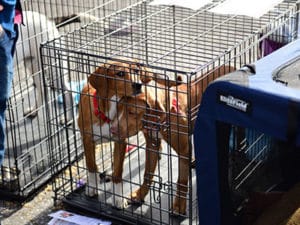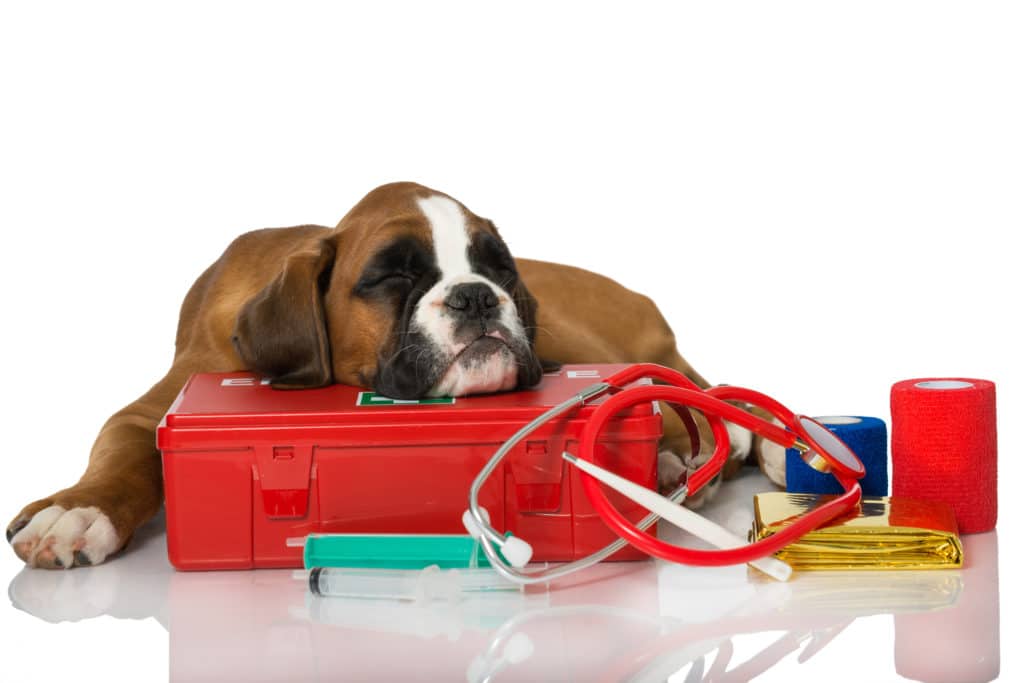
You may not be able to predict the specific circumstances of the disaster or know how long you may have to evacuate, but by creating a general dog emergency plan, you will have precautions in place that help you react in a way that best protects your pup.
ID Your Dog
This is probably the most important tip on the list. Why? Because there are a number of reasons why you might be separated from your dog during a disaster. Proper identification can make a big difference in reuniting you. Your dog should always have on a tag with your current contact information as well as a microchip.
Get a Rescue Alert Sticker
The ASPCA provides them for free if you fill out their form. By placing them in a spot that’s visible to rescue workers, you’re letting them know to look out for your animals in case you’re not at home (or able to return to your home) when disaster strikes.
Bring Your Dog Inside
Remember, animals often pick up on the signs of an impending disaster naturally — without the help of their local weather station. So, for instance, your dog may already sense that a hurricane is on the way long before you see any signs. And if he does, he may panic and run away or display other uncharacteristic or dangerous behaviors. You can help keep him safe by keeping him indoors.
Keep Them Separated
If possible, separate your dogs from any other animals in the home, such as cats or small pets, even if they normally get along. The impending natural disaster may significantly change your dog’s behavior and could endanger other animals in the home. Crates and carriers work well for this purpose, particularly if you all have to be in a small area together for safety reasons.
Take Your Dog With You
Don’t leave your pup behind if an evacuation is needed. If it’s not safe for you, and it’s not safe for your dog. Unfortunately, Red Cross disaster shelters don’t accept animals (unless it’s a service animal), so if that’s where you plan to go, you’ll have to make alternate plans for your dog. Talk to your veterinarian, animal control, or local animal shelters for other options, and also look to pet-friendly hotels or friends and family.
Create a Pet Emergency Kit
It doesn’t need to be fancy, but it should be easy to grab and take with you. Some items you should include are:
- At least 5 days’ worth of (unexpired) dog food
- A can opener (if needed to open the food)
- Feeding dishes
- Two weeks supply of your dog’s medication (if any)
- 7 days’ worth of bottled water
- Extra collar and leash
- Poop bags or garbage bags
- Blanket
- Toys
- A recent photo of your pet (in case you are separated)
- A copy of your dog’s medical records (to show your dog is up-to-date with vaccinations)
- Dog carrier or crate
- Pet first aid kit
Talk to Neighbors
As part of your preparedness plan for your dog, designate someone who is willing and able to help your dog if you are unable to because you’re out of the house when disaster strikes. This caretaker should be nearby, have a key to your home, and, ideally, be someone familiar to your dog. It’s also good to find someone who is home during the day if you are usually away at work.
Learn About Potential Catastrophes for Your Area
Different types of natural disasters require different precautions. For example, in a flood, you want to be at the highest location in your home, but for a tornado, a windowless room on the ground floor is safest. Find out what’s best for disasters that are most likely to strike your area, and ensure all family members — even your canine ones — follow those guidelines.
Have you been through a disaster with your dogs? How did you survive and what did you learn? Tell us in the comments.











